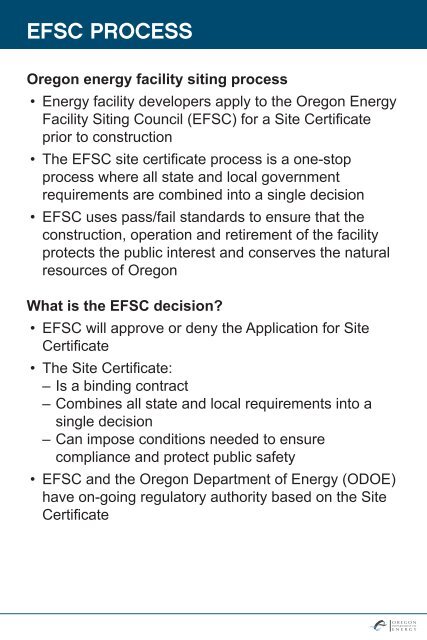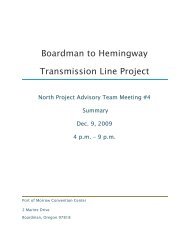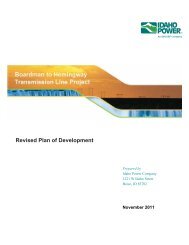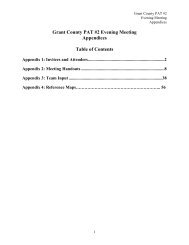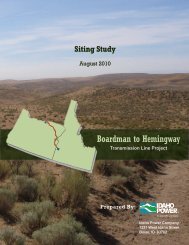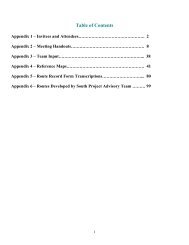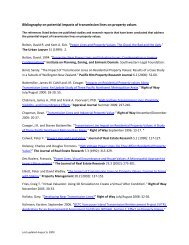efsc process - Boardman to Hemingway Transmission Line Project
efsc process - Boardman to Hemingway Transmission Line Project
efsc process - Boardman to Hemingway Transmission Line Project
Create successful ePaper yourself
Turn your PDF publications into a flip-book with our unique Google optimized e-Paper software.
EFSC PROCESS<br />
Oregon energy facility siting <strong>process</strong><br />
• Energy facility developers apply <strong>to</strong> the Oregon Energy<br />
Facility Siting Council (EFSC) for a Site Certifi cate<br />
prior <strong>to</strong> construction<br />
• The EFSC site certifi cate <strong>process</strong> is a one-s<strong>to</strong>p<br />
<strong>process</strong> where all state and local government<br />
requirements are combined in<strong>to</strong> a single decision<br />
• EFSC uses pass/fail standards <strong>to</strong> ensure that the<br />
construction, operation and retirement of the facility<br />
protects the public interest and conserves the natural<br />
resources of Oregon<br />
What is the EFSC decision?<br />
• EFSC will approve or deny the Application for Site<br />
Certifi cate<br />
• The Site Certifi cate:<br />
– Is a binding contract<br />
– Combines all state and local requirements in<strong>to</strong> a<br />
single decision<br />
– Can impose conditions needed <strong>to</strong> ensure<br />
compliance and protect public safety<br />
• EFSC and the Oregon Department of Energy (ODOE)<br />
have on-going regula<strong>to</strong>ry authority based on the Site<br />
Certifi cate
EFSC PROCESS<br />
ROLES AND RESPONSIBILITIES<br />
Energy Facility Siting Council (EFSC)<br />
• Seven-member citizen board<br />
• Makes policy and adopts administrative rules<br />
• Approves or denies site certifi cates<br />
Oregon Department of Energy (ODOE)<br />
• Serves as technical staff <strong>to</strong> EFSC<br />
• Responsible for administering the site application<br />
<strong>process</strong><br />
Public<br />
• Participates in the public information <strong>process</strong><br />
• Stays informed and provides comments on Idaho<br />
Power’s Notice of Intent and Application for Site<br />
Certifi cate and ODOE’s Draft Proposed Order and<br />
Proposed Order<br />
Idaho Power<br />
• Submits a Notice of Intent <strong>to</strong> apply for an Energy<br />
Facility Site Certifi cate<br />
• Submits a Application for Site Certifi cate in order <strong>to</strong><br />
build, operate and maintain the proposed project
EFSC PROCESS<br />
HOW DOES EFSC MAKE A DECISION?<br />
Oregon Department of Energy (ODOE) and Energy<br />
Facility Siting Council (EFSC) review the application using:<br />
• Pass/fail siting standards<br />
• Public and agency comments<br />
• Applicable state and local regulations<br />
EFSC uses the standards <strong>to</strong> determine whether <strong>to</strong><br />
approve or deny the Application for Site Certificate<br />
• Approve – <strong>Project</strong> meets standards or can meet<br />
standards with mitigation<br />
• Deny – <strong>Project</strong> does not meet standards<br />
EFSC siting standards for transmission lines<br />
• General standard of<br />
review<br />
• Organizational expertise<br />
• Structural standard<br />
• Soil protection<br />
• Land use<br />
• Protected areas<br />
• Retirement and fi nancial<br />
assurance<br />
• Fish and wildlife habitat<br />
• Threatened and<br />
endangered species<br />
• Scenic resources<br />
• His<strong>to</strong>ric, cultural<br />
and archaeological<br />
resources<br />
• Recreation<br />
• Public services<br />
• Waste minimization<br />
• Need for a facility<br />
• Electric and magnetic<br />
fi elds
EFSC PROCESS OVERVIEW<br />
Notice of Intent<br />
Public Information<br />
Meetings and<br />
Comment Period<br />
The NOI initiates public comment on the proposal and<br />
allows agencies and affected local governments <strong>to</strong> identify<br />
applicable requirements and special issues of concern.<br />
The NOI is not an application <strong>to</strong> construct the facility -<br />
it merely states the applicant’s intention <strong>to</strong> submit an<br />
application in the future.<br />
<strong>Project</strong> Order<br />
<br />
ODOE issues the <strong>Project</strong> Order which identifies applicable<br />
statutes, rules and ordinances and defines the impact<br />
analysis areas.<br />
Application for<br />
Site Certificate<br />
Public<br />
Comment Period<br />
<br />
<br />
The applicant submits its application which describes the<br />
facility, its anticipated impacts and how it will meet EFSC’s<br />
standards.<br />
The applicant must comply with all local land use<br />
requirements and indicate which land use permitting<br />
route they will take, either the local jurisdictional land use<br />
approval <strong>process</strong> or the EFSC land use permitting <strong>process</strong>,<br />
where EFSC acts in place of the local jurisdictions and<br />
makes the decision on compliance with local land use<br />
requirements.<br />
Draft<br />
Proposed Order<br />
<br />
After ODOE requests comments from the public and from<br />
other state and local agencies on the Application for<br />
Site Certificate, ODOE will issue a Draft Proposed Order<br />
recommending approval or denial of the application.<br />
<br />
ODOE holds public hearings on the Draft Proposed Order.<br />
Public<br />
Hearings<br />
○<br />
○<br />
Anyone can raise issues or objections <strong>to</strong> the Draft Proposed<br />
Order in writing or at the public hearings. Failure <strong>to</strong> comment<br />
in person or in writing on the record of this hearing precludes<br />
participation in the subsequent contested case and the right<br />
<strong>to</strong> appeal EFSC’s final decision.<br />
Since the EFSC <strong>process</strong> also serves as the land use<br />
<strong>process</strong>, the public hearings also serve as the land use<br />
hearings for this project.<br />
Proposed Order<br />
<br />
ODOE issues the Proposed Order based on comments from<br />
EFSC, the public and other government agencies.<br />
Contested Case<br />
Hearing<br />
<br />
The contested case hearing is a formal hearing and only<br />
those persons who commented on the Draft Proposed<br />
Order may participate in the contested case.<br />
Final Order<br />
<br />
EFSC decides whether it will issue the Site Certificate.


